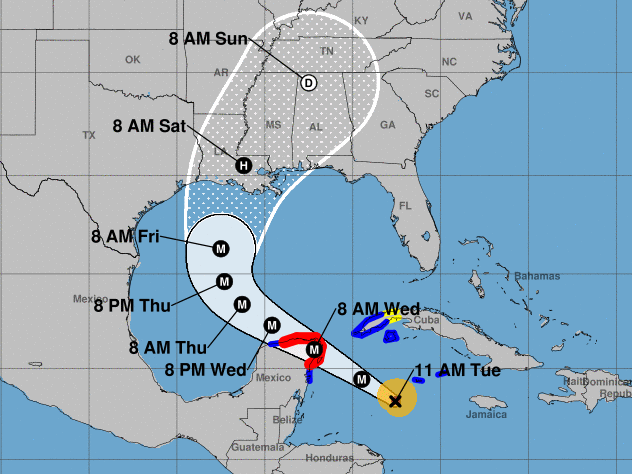to make landfall on the Louisiana coast late this week. National Weather Service hide caption

Hurricane Delta will pass over part of the Yucatan Peninsula before heading toward the Gulf Coast, where it's forecast to make landfall on the Louisiana coast late this week.
National Weather ServiceUpdated at 11 a.m. ET
Hurricane Delta has become a major storm, after rapidly intensifying in the Caribbean. The hurricane has sustained winds up to 115 mph; it's heading toward the northern Gulf Coast, the National Hurricane Center says. Its winds could soon top 130 mph.
"The hurricane is in the midst of a very impressive rapid intensification episode, having strengthened over 50 [knots] during the past 24 hours," NHC senior hurricane specialist Eric Blake said in an advisory early Tuesday.
Delta has grown quickly since early Monday morning, when its maximum sustained winds were only 40 mph. It's now forecast to grow into a Category 4 storm by Wednesday. That's when it will cross over part of Mexico's coast.
While the storm is expected to strengthen, cooler offshore waters and other conditions could weaken Delta slightly before it makes landfall on the U.S. late this week.
For now, Delta poses the most immediate threat to the Yucatan Peninsula, where resort spots such as Tulum and Cozumel are under a hurricane warning as the area awaits the storm center's arrival early Wednesday.
"Additional strengthening is forecast during the next 24 hours, and Delta is forecast to be an extremely dangerous category 4 hurricane when it reaches the Yucatan peninsula Wednesday," the hurricane center says.
Delta is 320 miles east-southeast of Cozumel, Mexico, moving west-northwest at 16 mph, the hurricane center said in its 11 a.m. ET update. When it reaches land, it will bring a storm surge that could raise water levels by 6 to 9 feet, along with large waves, the hurricane center says.
The storm is predicted to take a slightly more westward path than forecasters had been predicting on Monday. But it's then seen curling toward the north and northeast, and its potential landfall remains on the Louisiana coast – raising concern in a region that has already seen flooding and power outages from storms over the summer.
"This storm will affect Louisiana and everyone needs to prepare accordingly," Gov. John Bel Edwards said .
Delta raises the very likely prospect that the 2020 Atlantic hurricane season, which has already set records for its fast-paced activity, will now see more U.S. landfalls by named storms than any other recorded year.
"The 2020 Atlantic hurricane season is currently tied with the 1916 Atlantic hurricane season," meteorologist Philip Klotzbach says via Twitter, "for most continental US named storm landfalls in a season on record (9 landfalls)."

 Live Radio
Live Radio




